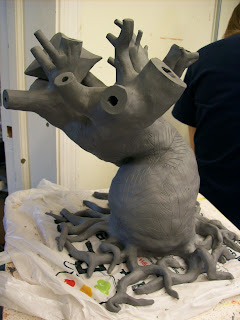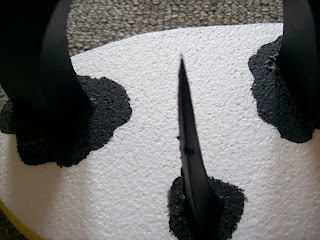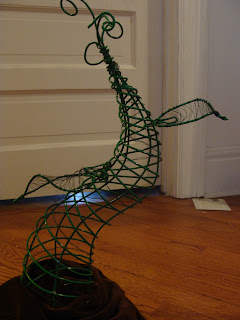In his search for Quality, the Narrator from Zen and the Art of Motorcycle Maintenance pauses briefly on grades. He says that grades decrease creativity and quality. The Narrator explains that in the grade system, students learn to desire the letter grade. The way to achieve the grade is to do what the teacher wants and because of this the system teaches the students to blindly follow the teacher’s lead. The Narrator makes it very clear that the system trains students to refuse to work unless there is a carrot held out for them and the threat of a whip behind them. Try to be too original and the system could punish you. Follow the spoken and unspoken rules and you get the highly desired A.
One of the first things the Narrator does to think his way through this idea is come up with a theoretical situation about an average student who had grown up in the system and was suddenly introduced to a school with no grades.
This student enters his first semester of school and has a hard time finding motivation to get his work done without the push of the grade system. There is no obvious punishment for not turning things in or not coming to class. At the same time, without any grades, there doesn’t seem to be any reward for actually doing the work and trying to learn the material. He doesn’t have anything from the outside pushing him to learn, his motivation has to come from the inside. He turns in the first couple assignments because it is habit. After a while he skips a class here or there and misses some of the material. The next time he comes to class, things don’t make as much sense so he skips the next class. Eventually he stops going to class altogether and drops out of school. This student gets a job after he leaves. Perhaps he never returns but as he progresses with his job he might want to learn more about his work. A couple years later he decides to go back to school and this time he has an interest in what he is doing, so he throws all his effort into class and does well. The lack of grades doesn’t hinder him the second time because he learns to gain knowledge, not a grade.
At this point the Narrator moves from his hypothetical situation to an experiment with his students. He withholds grades from one of his classes to see if better quality work will result. At first the students are confused. Many see it as an excuse to slack off because they don’t know how to learn without grades. For them, the grade system is the only way to learn; the only way to become educated.
The Narrator believes that the purpose of a university is to educate people. Society benefits from educated people who know how to think creatively and make good choices with the knowledge and experience they have. This system was set up to teach people what they need to know in order to do just that. Society assumes that college prepares students for the real world. In reality, if a student has grown up in the school system, he needs the real world to prepare him to get the most out of college. Instead of the creative thought needed for college and life beyond that point, school squashes creative thinking and teaches students to follow the leader. If the system set up to improve society by educating people actually decreases their creative ability, something is awry.
Because of this, the students in the Narrator’s class see the absence of grades as a breakdown of everything school has taught them. Without grades, his students have no idea how tell if they are learning something or not. They have never experienced any other kind of feedback. The students are thrown into a new way of learning that they have never experienced before. Some of students turn in work and come to class but none of the work is high quality and any involvement in class discussions is halfhearted. The majority of the class doesn’t even show up the first few weeks.
If the Narrator were to stop the experiment at this point it would look like the experiment failed. The lack of grades is not producing higher quality work from the students; instead it is not producing any work at all. One of his co-workers asks the Narrator what he is going to do with a bunch of students that won’t even bother to come to class. He replies “Wait them out.”
As the class goes on the students dive deeper into the class. Conversations in class turn into actual discussions and people share their ideas. The students begin turning in excellent work. Some adjust better than others do but at the end of the class most of students are involved in discussions and actively learning. The Narrator did provide them with constructive criticism and feedback on the work that they turned in. A lack of grades does not mean stumbling blindly around trying to find the answers.
As the Narrator looks at the results of his class, he concludes that students do well without grades but only if the teacher sets some type of goal for the students. He doesn’t know how a teacher might set that goal without reducing creativity in the classroom nor does he pursue that idea to a point where he might find an answer. His ideal class would include students who instinctively know what quality is without him having to teach them.
I believe he comes to the conclusion that the very act of teaching limits creativity. He starts with the idea that a certain part of the system is the problem and concludes, without coming right out and saying it, that something is wrong with the entire system. But instead of thinking through to a possible answer he drops the subject entirely and moves on in his pursuit of quality.
The Narrator establishes some good points about grades and it was interesting to read about his experiment with his students but I think that his arguments are lacking. While I didn’t need much persuading to agree about the grade system I don’t think that someone who had grown up in the system would readily agree with the Narrator. It is an interesting subject but one that is not covered very well in the book.
If the grade system changes, students still need some kind of feedback on how they are doing or they need the teacher to set the goal for them. If the goal is not an A then there needs to be a concept or idea to master. Ideally this goal should help facilitate learning and discussion. If, at the end of the class the students are able to talk about or think about this concept in a more intelligent way and with more understanding and knowledge than they could before, then that is more valuable that an A.
The Narrator’s thoughts and ideas on the school system, grades, and the quality that might be found within those structures is interesting and worth thinking about but he doesn’t spend enough time on the subject to produce a sturdy argument.































